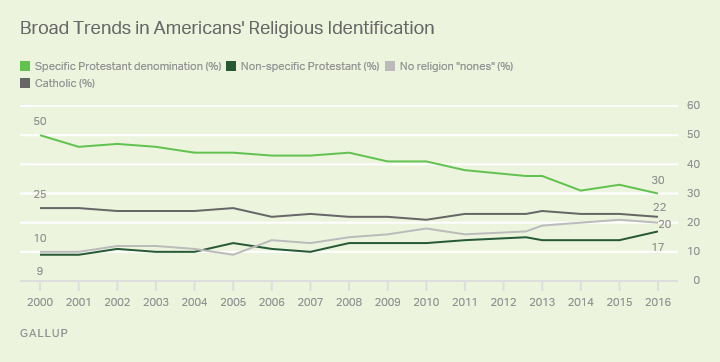The Long View 2006-09-13: Animal Rights; Surveys; Der Waldzellspieler
As a Thomist, I am also an essentialist. Essences or forms, εἶδος, distinguish different kinds of things from one another. This idea is so rooted in Western thought that even people who oppose it often act as if they presuppose it to be true. When someone genuinely acts otherwise, it can be kind of weird.
Your dog does not want recognition of its doggieness; it wants tasty treats and to go for a walk. In fact, projecting human-rights categories onto animals is a greater assault on their natures than the outrages in which the leering Singer and Mason so shockingly acquiesced.

Gallup poll data on American religious affiliation
There is an interesting bit on the rise of the Nones. Survey data is always tricky. The error bars are big, and how you ask the questions matter. In this case, many Nones still attend worship services at a particular place, on a semi-regular basis. The Gallup poll data for the image above didn't drill down as far as the address or name of the place people worship, which probably means this data overstates the case a bit.
"We find that just asking about religious preference, 33 percent of respondents said, 'I don't know about my religion,' " Dougherty said. "But five questions later, they gave us the name of their congregation."
I don't doubt that religious disaffiliation is occurring, but it might be happening more slowly, and represent a smaller shift in behavior, than it might seem.
Animal Rights; Surveys;
Der Waldzellspieler
What is the philosophical engine for animal rights? The question occurred to me after reading this contribution from Wesley J. Smith at First Things:
at all
Smith notes some sensible things Francione has said, but then continues:
[Francione] makes no distinction at all between that which is done to a human and what is done to an animal. In the Abolitionist essay, for example, Francione castigates Singer for having participated in the artificial insemination of turkeys, which the writer literally equates with the rape of women:...[Francione says] "I suggest that there is no non-speciesist way to justify what Singer and Mason claims [sic] to have done without also justifying the rape of a woman, or the molestation of a child, in order to see what those acts of violence ‘really involved."
The loathsome Kojève argued that there was an irreversible erasure of distinctions between classes of people over time because of Hegel's Master-Slave dialectic. Slaves want their humanity to be recognized; masters want the recognition of their peers. So, over time, the social and geographical range of "peers" tends to grow. This is a fishy notion on historical and anthropological grounds, but it's part of the reason why the principle of civil equality, which makes perfect sense in a racial context, has been deployed to attack the category of childhood and the gender component of the institution of marriage. What seems to have happened with animal rights is that the dialectic-machine has been left running even after it has used up all plausible material. Your dog does not want recognition of its doggieness; it wants tasty treats and to go for a walk. In fact, projecting human-rights categories onto animals is a greater assault on their natures than the outrages in which the leering Singer and Mason so shockingly acquiesced.
* * *
Yes, there is a Muslim take on Spengler (pbuh). Well, a Turkish take.
* * *
Baylor study finds religion thriving in the U.S., says a recent headline. Since Baylor University is in the religion business, this is another situation where we should not be surprised that a survey commissioned by the National Ice Cream Council finds that ice cream is America's favorite dessert. That, of course, does not mean that ice cream is not America's favorite dessert. In any case, we read:
Baylor researchers went beyond asking people to identify their faith or denomination and asked for names and addresses of any worship centers they attend, he said.
"We find that just asking about religious preference, 33 percent of respondents said, 'I don't know about my religion,' " Dougherty said. "But five questions later, they gave us the name of their congregation."
The confusion stems from the rise of nondenominational churches, he said.
This assessment does sound reasonable. There have been reports that secularism is the fastest growing religious orientation in America, but they do not chime with anecdotal evidence.
* * *
Some surveys are beyond question, like this one from the The Malthusian Institute:
"Our survey of households in seven U. S. regions demonstrated that few citizens have bothered to equip themselves with fireproof suits and extinguishers to deal with volcanic upheaval, solar flares, or the Lord's purifying flame," Malthusian Institute director James Olheiser said. "Almost no one is prepared for a sudden shift in the Earth's polarity or the eating of the Sun and moon by evil wolves Skol and Hati during Ragnarok."
Solar flares would not start fires, but they might bring down the electrical-power grid. Dealing with the eschatological wolves is a toughie, though.
* * *
Meanwhile, back in Bavaria, Benedict XVI continues to say very smart things, about which the press persistently miss the point. Consider this:
At the end of his lecture, the Pope again quoted Manuel and said: "It is to this great 'logos', to this breadth of reason, that we invite our partners in the dialogue of cultures."...
Benedict, a leading theologian who has always drawn clear lines between Roman Catholicism and other faiths, also appeared to criticize Protestant churches and contemporary Third World theologians for not stressing the link between faith and reason clearly enough. ...Benedict stressed that his criticism of modern empirical reasoning "has nothing to do with putting the clock back to the time before the Enlightenment and rejecting the insights of the modern age."
"The intention here is not one of retrenchment or negative criticism, but of broadening our concept of reason and its application"...
The bit about the Muslims is no doubt interesting from the perspective of the troubles of the current generation, but Benedict's attitude toward reason is important for the long term. What we should be thinking about here is not the dreary puppet-show conflict between science and religion, but the final assimilation of the Enlightenment to the Western tradition. The following excerpt from Hermann Hesse's The Glass Bead Game (quoted in The Second Religiousness in the 21st century) describes the era that Hesse imagined would follow modernity:
(Here is a full review of The Glass Bead Game).
For two centuries now, there have been Catholics, and sometimes even popes, who thought that the Enlightenment was what was wrong with the world. The better view, I have long held, is that we should extend to the Enlightenment, and to modernity as a whole, the sort of sympathetic understanding that we would extend to any historical era. As Hocking put it, historical progress consists in large part of the accumulation of "unlosables," of advances that survive the excesses of the ages in which they are made. Benedict XVI is suggesting that the unlosables of Western modernity, the music and the physics and the institutions of political liberty, can be preserved through the understanding of reason as the perception of the logos: reason is not naked logic, but faith in the fundamental comprehensibility of the world.
* * *
Incidentally, Benedict XVI likes at least one Hesse novel, according to this bit of text that has spread to a dozen Hesse sites:
Cardinal Joseph Ratzinger, who was elected Pope Benedict XVI, once said that Steppenwolf is among his favorite books because it "exposes the problem of modernity's isolated and self-isolating man". The protagonist, Harry Haller, goes through his mid-life crisis and must chose between life of action and contemplation.
As I have said before, it is easy to imagine Joseph Ratzinger as a Player at Waldzell.
There is a Waldzell Institute, by the way, whose name is taken from the Game Center in the Hesse novel, but I don't know whether Cardinal Ratzinger ever attended one of their conferences.
Copyright © 2006 by John J. Reilly

Comments ()